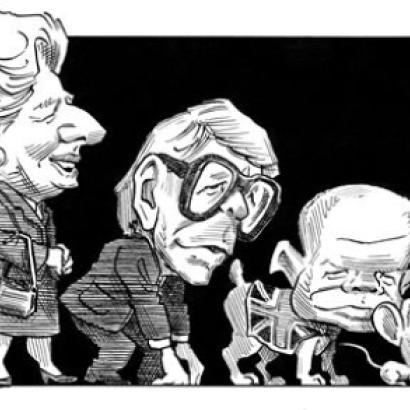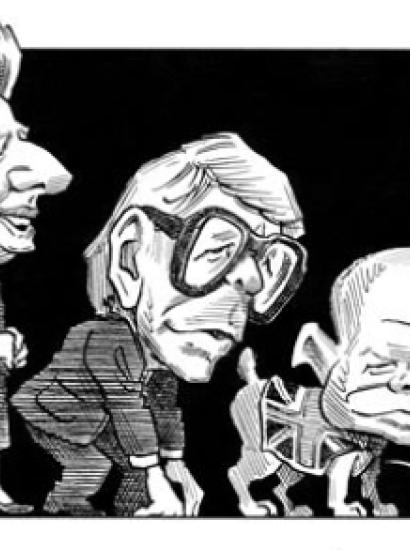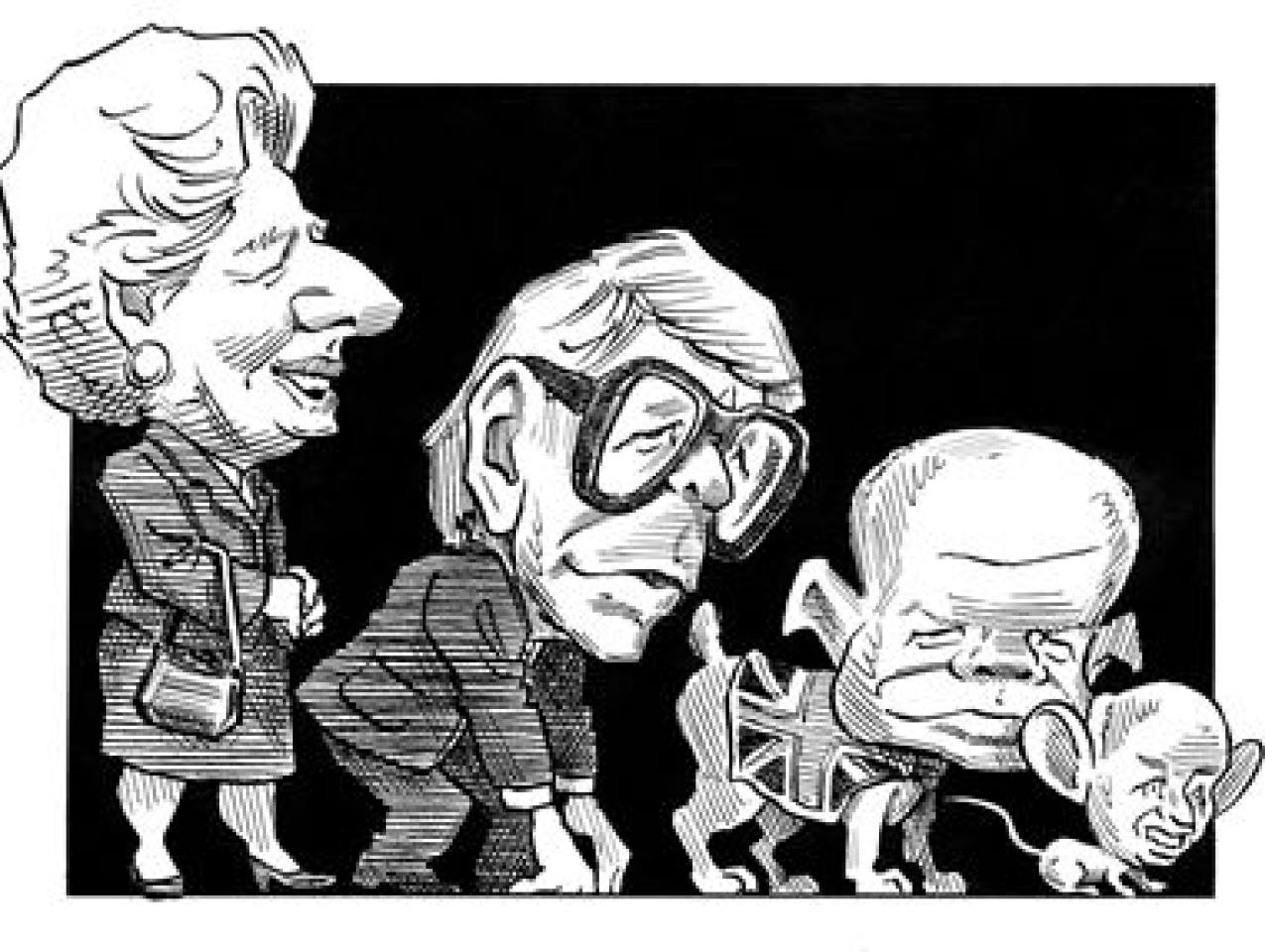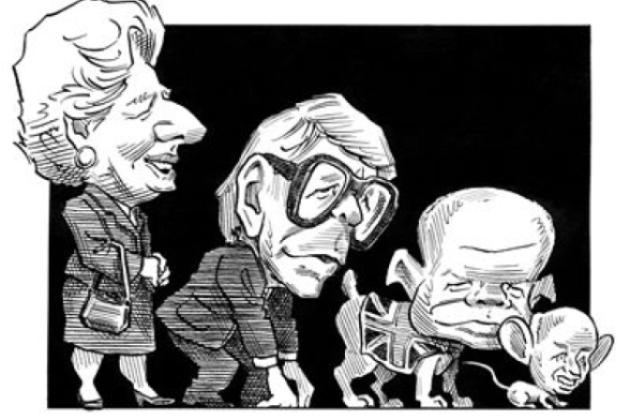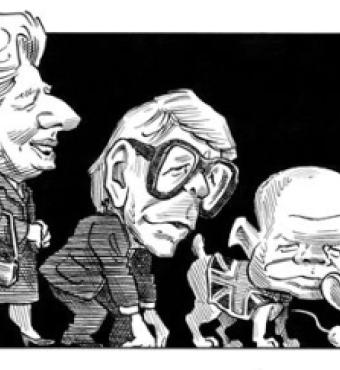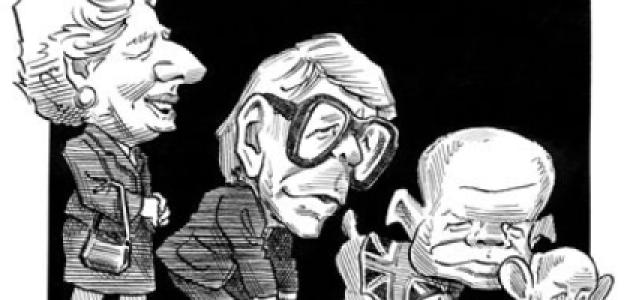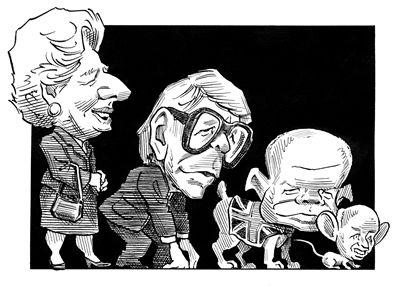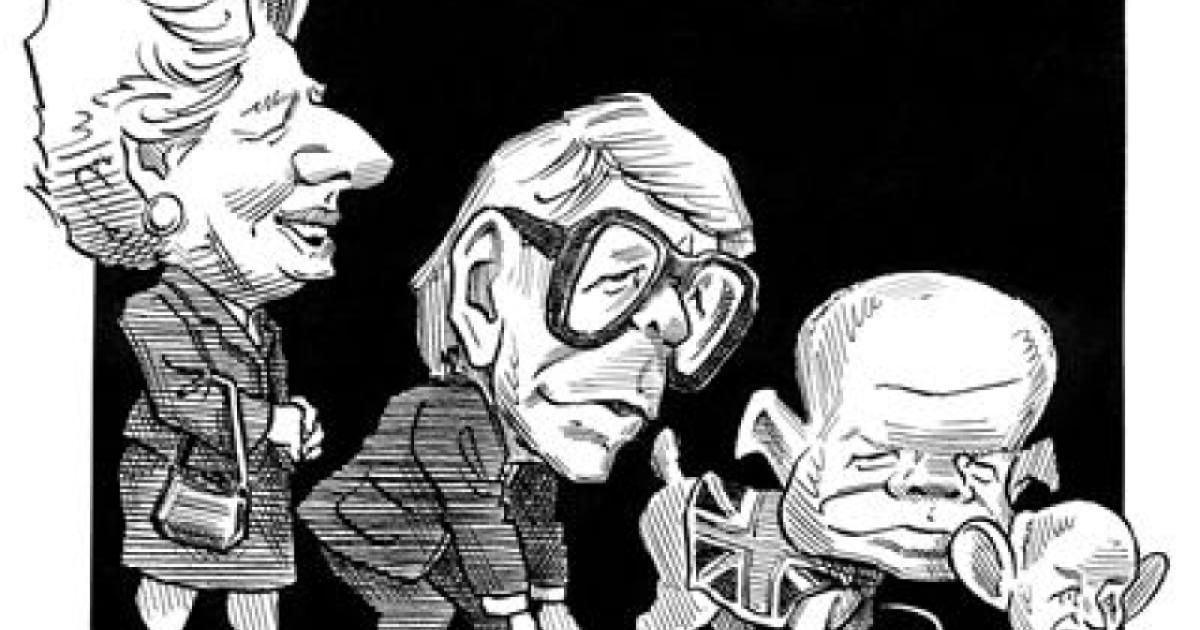- International Affairs
The British Conservative Party has been suffering in the political wilderness for the last 5 years after an unprecedented 18 straight years in office (1979–97). Long gone is the image that Mrs. Thatcher crafted of a nearly invincible Conservative Party. Now, while other conservative parties in Western Europe, and the Republicans in the United States, are enjoying comparative success, the British Conservatives are on the outside looking in. Why are the Conservatives in such bad shape, and what are the prospects for their recovery under the new leadership of Ian Duncan Smith?
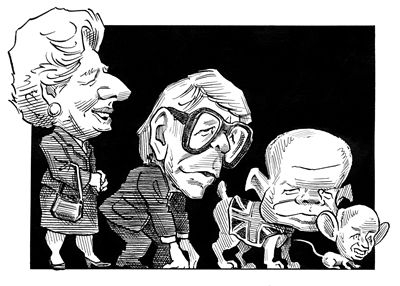
Political success often seems to carry within it the seeds of later failure, and likewise huge success seems often to lead to huge failure. Looking back at British politics over the last two decades, it appears that the seeds of Conservative misery today can be found in their incredible success—winning four straight elections and holding office for the longest period of any political party during the last century.
Two special conditions seem to have contributed to the Conservatives’ current troubles: (1) the consequences of being in office too long and (2) the consequences of the unique leadership of Mrs. Thatcher along with the powerful ideas and party culture that she brought to British politics, which came to be known as "Thatcherism."
The Train Wreck
All governments have life cycles: first, the honeymoon period, when the new government enjoys a high degree of credibility and legitimacy; then a "normal" governing period; and finally a gradual (or not so gradual) breakdown of authority, effectiveness, coherence, and discipline. Governments that remain in power for a long time tend to run out of gas and get into trouble; at the end stage, most governments seem to get into considerable trouble.
For the Conservative Party, 18 straight years in power allowed time for this aging process to occur—and then some. Several senior Conservative leaders in the Thatcher and John Major cabinets understood that their government was aging poorly. After three terms in office, some Conservative leaders even came to hope that the party would lose the 1992 election so that they would have a period in opposition to catch their collective breath and develop new leadership and policy ideas. But they won an upset victory in 1992, and their worst fears about a fourth term came true. Discipline and coherence collapsed both within the cabinet and in the party at large. Conservatives fought with one another, undermining their prime minister, while the press used a string of some two dozen "sleaze" episodes and the sudden collapse of the British pound to make the case that the Conservatives were spiraling into a mess.
After five agonizing years the Major government fell, in a massive electoral defeat in 1997. The Conservatives were left with fewer members in the House of Commons than they had had in more than a century. The long run of successes had quickly ended in a train wreck. The party even had trouble finding new leadership. Prime Minister Major resigned his party leadership instantly, a number of his senior colleagues were swept away by the election, and the remaining leadership fell into a kind of political shock that lasted for many months. Then came angry years of internal party warfare, mostly fought around the issue of Britain’s role in the European Union and the question of Britain adopting the new euro currency. But the true struggle was for the heart and soul of the party. Labour’s powerful majority, coupled with the collapse of the Conservatives, led many prospective Conservative leaders to feel that they might as well go to the sidelines and build separate careers because it would be a very long time indeed before they would have a chance to get back into power.
Thatcherism: Rise and Fall
The other important factor causing Conservatives misery after their electoral defeat in 1997 was the unique nature of Mrs. Thatcher’s success as prime minister and party leader. Thatcherism produced an enormous change in British politics, including within her own party. When she became party leader in 1975, and even when she took office as prime minister in 1979, most Conservative Party members (and even her fellow members of Parliament) were strangers to her new ideas and style. Most were still wedded to Churchill’s 1947 reforms, which accepted many of Labour’s postwar ideas that created the managed economy and the welfare state. This meant Conservative support for a long list of industrial nationalizations as well as the creation of the National Health Service. Churchill and his colleagues undertook these commitments because they believed that the Conservative Party would be sentenced to permanent opposition if it did not heed the lessons of its enormous and surprise postwar election disaster in 1945. It was clear to them that Labour had mined a powerful wish by the British electorate that government protect it from a return to the misery of the Depression.
Churchill’s dramatic embrace of Labour’s social democracy was accepted by a highly deferential Conservative Party whose political philosophy was vague and shifting. Mrs. Thatcher criticized this "rootlessness," arguing that the party needed a strong base of ideas. Although she proved to be more of a political pragmatist in her actual operating style in government, she insisted on a strong philosophical fidelity to her more-radical views, which she always preached in an unyielding way that left little room for meaningful counterargument. The hectoring style and stubbornness of the "Iron Lady" dominated her cabinet and the party. Those who didn’t go along were purged from the inner circle.
|
"Blair and Brown have maintained fiscal discipline, they have continued to press the privatizations that Mrs. Thatcher initiated, and they have controlled social welfare spending—even at the risk of souring their own supporters." |
Although her style was highly successful in the beginning, in the long run it proved to be a liability. Her downfall came at the hands of her fellow Conservative members of Parliament in 1990, not only because she had grown deeply unpopular with the wider electorate as well as with her parliamentary colleagues, who tired of her difficult personality and blamed her for a growing recession, but because of what they saw as inflammatory policies (such as her infamous poll tax, which replaced the traditional property tax with a head tax that imposed sharply higher costs on many of her middle-class supporters).
Although John Major proved to be a considerably gentler and more diplomatic leader, he fell victim to the internal party divisions caused by Mrs. Thatcher’s conflictual style. Consensus was disparaged and—as they said about Mrs. Thatcher—discussions in the party began as an argument, continued as an argument, and ended as an argument. This style served the party badly in the last years of its incumbency and especially in opposition. The center of the party became markedly rigid and inflexible, not allowing for serious and effective reform of ideas or strategies. Everything came to be measured by its fidelity to the Thatcher legacy and Thatcherism as a philosophy.
Of course, no discussion of the reasons for the especially miserable condition of the Conservative Party would be complete without giving credit to the skill of its Labour opponents. Tony Blair and his closest colleague (and sometimes rival), Chancellor of the Exchequer Gordon Brown, have done a superb job in keeping their opponents miserable. On the policy side, Blair and Brown skillfully co-opted and enhanced the most successful elements of the Conservative agenda. They kept fiscal discipline, they continued to press the privatizations that Mrs. Thatcher had initiated, and they controlled social welfare spending—even courting the unhappiness of their own supporters. They transformed the loser image of Labour into that of a solid governing party.
|
"There is precious little consensus in today’s Conservative Party. Every policy discussion begins as an argument, continues as an argument, and ends as an argument." |
Most important, Blair and Brown kept the economic situation in good shape. Even when the United States fell into recession, the British economy, contrary to historical experience, did not. Britain’s economy has been remarkably resilient—the most buoyant in Europe. This has given Labour a long period in which to build its governing credibility, to an extent enjoyed by no previous Labour government over its hundred-year history. And it has robbed the Conservatives of their cherished argument that Labour cannot be trusted with the economy and that only the Conservatives can produce prosperity. The Labour government has also stayed tough with the British union movement. For years, Mrs. Thatcher maintained broad support by claiming that only Conservatives could keep union power in check and that to choose Labour was to choose the unions (and the chaos and economic stagnation that the partnership seemed to bring during Labour’s last period of office in the 1970s).
The Long Road Back
So what are the prospects for Conservative recovery? The road back will most likely be long: The Conservatives have suffered two severe defeats, and the distance they need to make up in both public opinion polls and electoral results is monumental. Even those in the party leadership admit, in private, that they are not thinking of being able to return to office in the next election but rather the one following—that is, in perhaps 7–8 years. But the Conservatives have several advantages in historical context and in the traditional nature of their party.
First, the Labour government is at the end of its fifth year in office; the average survival time for governments in Britain is about eight years. The Labour government is reaching middle age and becoming more vulnerable to the same kind of political aches and pains that the Thatcher-Major governments displayed. Although no one can predict how long Labour will survive, the Conservatives can reasonably expect that Labour is now vulnerable enough that the Conservatives can begin to take on the role of a normal opposition rather than being dismissed as politically irrelevant (as they have been for the past five years). Once a coherent and strategically effective opposition is established, it can take advantage of political troubles that befall the government—such as the recent spate of trouble over the delivery of public services such as education, health, and transport. Of course, Labour will be working hard to keep the Conservatives where they have been, but the early signs in 2002 are that the government is becoming distracted by its own troubles.
Second, there are clear signs that the Conservatives’ appetite for winning is returning. At least for the moment, the Tories appear ready to fight with Labour more than among themselves. The Conservatives’ traditional "will to win" has encouraged the party historically to be more flexible, pragmatic, and unified than Labour. Thatcherism dampened down the party’s nimbleness in favor of a confident, nearly arrogant, sureness that allowed little room for dissent or change. But 10 years after Thatcher and two electoral defeats later, the party, under Ian Duncan Smith (himself a Thatcherite), seems to be rethinking its policy agenda across the board in a more inclusive and accommodating direction. Although some had predicted that Duncan Smith would prove to be a "disastrous right-winger," it is beginning—and I emphasize beginning—to look as though he intends to use his credibility with the Thatcher wing of the party as a secure base from which to move the party toward the middle of the political spectrum.
The previous leader, William Hague—with his deputy leader Peter Lilley—tried to do the same, but the post-1997 Conservative Party would have none of it, taking the case for reform as part of a war for the heart and soul of the party rather than a vehicle by which it could challenge Labour. Now, five years on, the appetite for winning elections is returning and with it a sense that finding a much wider electoral base requires that the party become more open to a breadth of policy ideas and become more inclusive in party membership. That recipe was at the heart of the Labour Party revival that allowed Tony Blair to convince the electorate that Labour could be trusted to retake office. Yet, at this stage, the broadening of policy and membership has not been put into practice, only talked about by the leadership (to an apparently receptive audience). Once these ideas are converted into policy statements, the debate within the party will begin in earnest and we will learn whether this is a new day or a rerun of the Hague leadership period that ended in electoral disaster last year.
|
"At least for the moment, the Tories finally appear ready to fight Labour more than each other." |
Finally, the Conservatives seem to have gained a powerful friend. The British media now seem to want the Conservatives to become a "real" opposition force. This is an exceedingly important change. Only a year ago—and for some years before—the British press was very much taken with Blair and New Labour while very critical of the Conservative Party (especially in the last years of the Major government). Internal Conservative Party wars, sleaze, and disrespect for its leadership made good copy. This is changing, not so much because of anything the Conservatives have done but because the media have become disillusioned with Labour. They are tired of what they see as Labour’s blatant, nonstop efforts to spin the news; Labour’s rewarding and punishing the media depending on the friendliness of stories; and what they see as deception on public policy coming out of Number Ten Downing Street. Stories about public service failures and Labour Party wars have thus taken the front and center position. Stories about the Conservatives are fewer and less hostile. Some observers have even suggested that the press has been coaching the Conservatives, eager to put them back at the heart of British politics.
The Political Pendulum
There is an expression in British politics that the pendulum swings from one party to the other. This process occurs in every democratic political system. In Britain for the last 75 years, the pendulum has swung between the Conservative and Labour Parties. Although we can be certain that the pendulum will swing again, it is not certain that the Conservatives will be the party to replace Labour. Certainly the historical odds favor the Conservatives, but we need also to consider Britain’s third party, the Liberal Democrats.
British politics has been undergoing significant changes since Mrs. Thatcher came to power more than 20 years ago. Political parties have been reforming and realigning, and the Conservatives’ recent decline is one of those developments. So too is the rise in the fortunes of the Liberal Democrats. In fact, their rise to more than 50 members in the House of Commons has come largely at the expense of the Conservatives. So a third party of significance is available to provide an alternative if the Conservative revival fails. This prospect does not yet have the Conservative Party shaking in its boots, but it has begun to look over its shoulder.
It is amazing that out of Mrs. Thatcher’s powerful success has come a process of political change in Britain that has spread far beyond her wildest expectations—or indeed her wishes.








